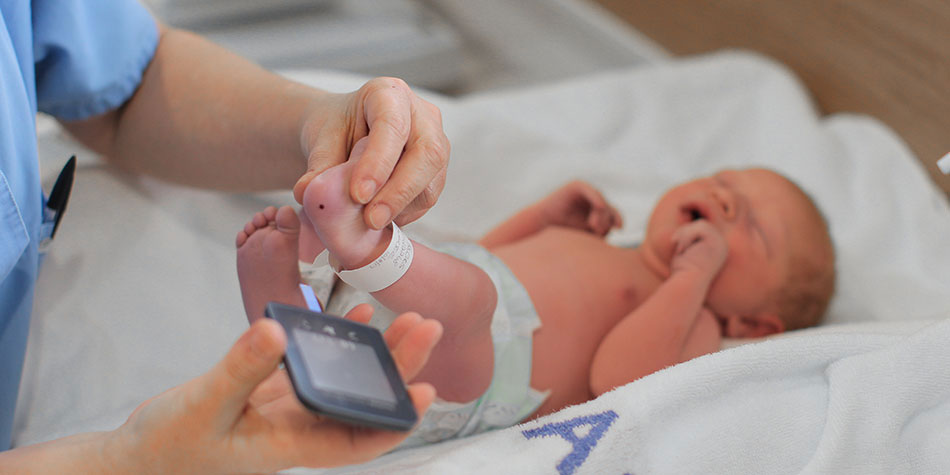
At EIRMC’s Women’s Center, your baby’s health is our highest priority. Before going home, your baby will receive a series of screenings so you can feel confident that your little one is healthy and ready to meet the outside world. Newborn screenings include blood, heart and hearing tests to check for serious but rare (and mostly treatable) health conditions. Typically done a day or two after a baby is born, these screenings allow for early treatment if a health condition is detected.
To schedule a maternity tour or learn more about our labor and delivery services, call (208) 227-2400
Common newborn screenings
Your baby will receive these tests before going home:
- Heart screen, which includes blood pressure and pulse oximetry (oxygen saturation), to check for critical congenital heart defects (CHDs/CCHDs)
- Bilirubin screen, which tests for jaundice
- Hearing screen
- Metabolic screen
Let’s take a closer look at some of these screens.
Metabolic screen (blood test)
Newborn blood screens at EIRMC test for 30 health conditions, including thyroid disorders, certain types of anemia, and cystic fibrosis, a disease of the lungs. This panel screens for an inherited condition called phenylketonuria (PKU), an amino acid metabolism disorder. Babies with PKU can’t break down (metabolize) an amino acid called phenylalanine, which helps to build protein in the body. When that happens, phenylalanine builds up in the blood and causes health problems that usually become apparent around six months of age.
According to the March of Dimes, most newborn screening results are normal. If they’re not, it may simply mean more testing needs to be done. Your baby’s pediatrician will perform the second part of the PKU test, typically at two weeks of age.
Bilirubin screen (jaundice test)
Jaundice is a common newborn condition that turns a baby’s skin and the whites of their eyes yellow. Around 60 percent of newborns have jaundice. Most of the time, the condition is mild and goes away on its own. But severe jaundice that doesn’t get treated quickly can lead to brain damage.
Jaundice is caused by a buildup of bilirubin, a yellow substance that is formed from the normal breakdown and recycling of red blood cells. Bilirubin is removed by the mother’s liver during pregnancy, but it may take a few days after birth before your baby’s liver is developed enough to do this.
Health conditions can also cause jaundice, including:
- Blood type mismatches, such as Rh disease, in which Rh-negative mothers give birth to Rh-positive babies (Rh incompatibility)
- Infections such as sepsis
- Liver or red blood cell problems
- Untreated urinary tract infection (UTI) in mom
Breastfed babies are more likely to have jaundice than their bottle-fed counterparts, especially if they’re not feeding well. Call your doctor right away if your baby looks yellow, orange or greenish yellow, or if there are other signs that something isn’t right.
Hearing screen
Hearing loss is a common birth defect. Early diagnosis and treatment can help children with hearing loss develop speech, language and social skills. Before leaving the hospital, your baby will be given a hearing test called the automated auditory brainstem response. This involves placing electrode patches on your baby’s head. The patches are hooked up to a computer and can monitor your baby’s brainwaves, even when sleeping. Soft earphones are placed in your baby’s ears and sounds are played from the computer.
When the test is complete, your care team can see whether your baby’s outer ear, middle ear and inner ear are formed correctly and if the pathway from the ear to the brain is complete.
There are three reasons that the test may show irregularities:
- Fluid buildup in the ear
- Wax buildup in the ear from vernix, the waxy substance that a baby is covered with at birth
- Congenital hearing defect
The first two should resolve on their own before your baby goes home. A second hearing test typically shows that the issue has cleared up. If the second hearing test still shows problems, we can refer your baby to an audiologist for outpatient follow-up.
If your baby shows any signs of hearing loss after you get home, such as not being startled by loud sounds, not turning toward a sound after 6 months of age, or delayed speech, see your pediatrician as soon as possible.
EIRMC has Pediatric Occupational Therapists who specialize in addressing speech and language issues in children. Ask your pediatrician for a referral to EIRMC pediatric therapiesat (208) 529-7982.
$webqFacilityNumber
Need a Physician?